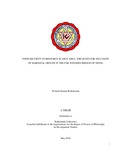Please use this identifier to cite or link to this item:
http://archive.nnl.gov.np:8080/handle/123456789/232Full metadata record
| DC Field | Value | Language |
|---|---|---|
| dc.contributor.author | Bishokarma, Nirmala Kumar | |
| dc.date.accessioned | 2019-03-27T09:43:56Z | |
| dc.date.accessioned | 2020-08-21T07:26:47Z | - |
| dc.date.available | 2019-03-27T09:43:56Z | |
| dc.date.available | 2020-08-21T07:26:47Z | - |
| dc.date.issued | 2019-03-27 | |
| dc.identifier.uri | http://103.69.125.248:8080/xmlui/handle/123456789/232 | - |
| dc.description.abstract | Entitlement theory developed by Amartya Sen in1981 is still relevant for analyzing the issues of access to food. The concept of production and exchange entitlement of the people to acquire food they need is important for food security. In this regard, it gives special attention to the legal means and market mechanism to generate entitlement on food. However, there is a need of inclusion of broader aspects of resource endowments as well as the role of non-market institutions in the framework. More importantly, framework and concepts have not adequately addressed the issues of exclusions and inclusions. To understand food security in the context of society like Nepal, it is relevant to look at the issues from a more holistic, people-centered and participatory perspective. Building on the entitlement theory of Sen, I have developed conceptual framework for the study. I have contributed how formal and informal instidutions expand and limit the entitlement of different groups. I believe that the framework captures the issues. 203 Seasonal migration continues to be major income strategy Seasonal migration is a major instrument for food entitlement of the poor households. This migration is an institutionalized practice among them. At least one male family member from almost the entire poor houses migrates to India for seasonal labor. The remittance is a major income strategy among them, which they essentially expend for purchasing food. In addition to this, it is a very viable mechanism for them to cope during loss in agricultural production, hike in food price, death of family members and livestock as well as risk of natural disasters. It is the only option for them to deal with these vulnerabilities. However, this practice is not sustainable from their perspective. It has increased the number of female household heads. Though female are empowered to manage their household and community affairs, they face many types of social and economic liabilities in the absence of their spouses. The Government policies are unable to promote marginal cultivators The Government policies so far are unable to target the households who have limited land. | en_US |
| dc.subject | Seasonal migration continues to be major income strategy | en_US |
| dc.subject | Food entitlement framework addresses the issues of exclusion and inclusion | en_US |
| dc.title | Food Security in Resource Scarce Area: The Quest for Inclusion of Marginal Groups in the Far-Western Region of Nepal | en_US |
| dc.type | Thesis | en_US |
| Appears in Collections: | 300 Social sciences | |
Files in This Item:
| File | Description | Size | Format | |
|---|---|---|---|---|
| Nirmal BK - PhD thesis-pdf form.pdf | 3.82 MB | Adobe PDF |  View/Open |
Items in DSpace are protected by copyright, with all rights reserved, unless otherwise indicated.